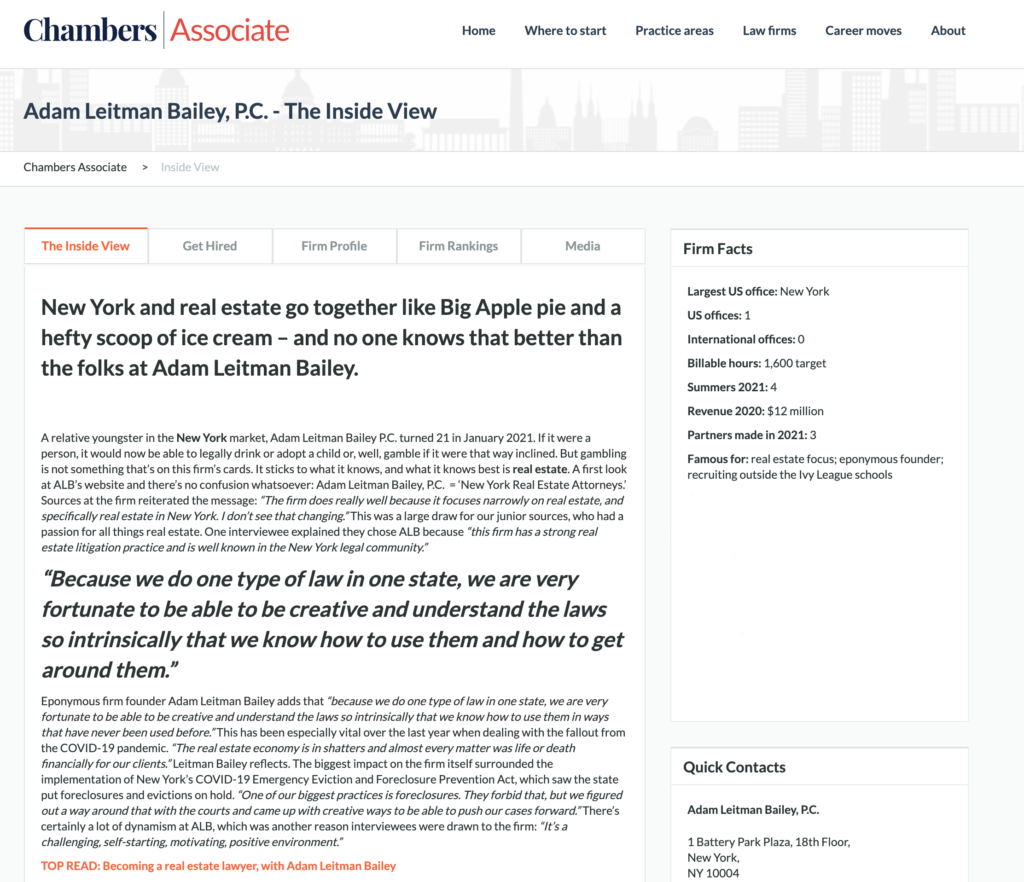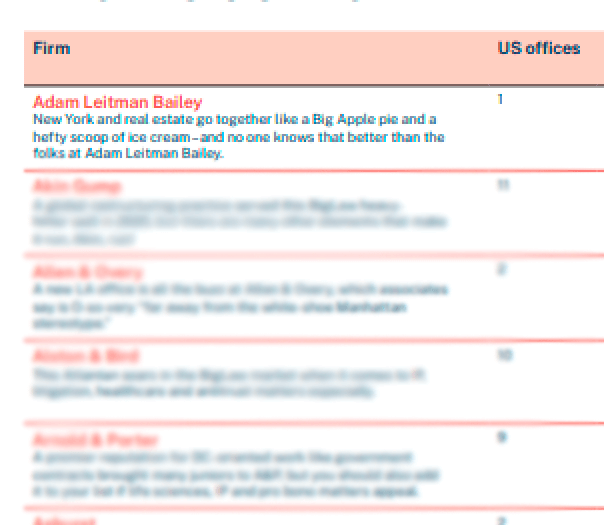Adam Leitman Bailey, P.C. Featured in Chambers Associate’s 2021 Guide

New York and real estate go together like Big Apple pie and a hefty scoop of ice cream – and no one knows that better than the folks at Adam Leitman Bailey.
A relative youngster in the New York market, Adam Leitman Bailey P.C. turned 21 in January 2021. If it were a person, it would now be able to legally drink or adopt a child or, well, gamble if it were that way inclined. But gambling is not something that’s on this firm’s cards. It sticks to what it knows, and what it knows best is real estate. A first look at ALB’s website and there’s no confusion whatsoever: Adam Leitman Bailey, P.C. = ‘New York Real Estate Attorneys.’ Sources at the firm reiterated the message: “The firm does really well because it focuses narrowly on real estate, and specifically real estate in New York. I don’t see that changing.” This was a large draw for our junior sources, who had a passion for all things real estate. One interviewee explained they chose ALB because “this firm has a strong real estate litigation practice and is well known in the New York legal community.”
“Because we do one type of law in one state, we are very fortunate to be able to be creative and understand the laws so intrinsically that we know how to use them and how to get around them.”
Eponymous firm founder Adam Leitman Bailey adds that “because we do one type of law in one state, we are very fortunate to be able to be creative and understand the laws so intrinsically that we know how to use them in ways that have never been used before.” This has been especially vital over the last year when dealing with the fallout from the COVID-19 pandemic. “The real estate economy is in shatters and almost every matter was life or death financially for our clients.” Leitman Bailey reflects. The biggest impact on the firm itself surrounded the implementation of New York’s COVID-19 Emergency Eviction and Foreclosure Prevention Act, which saw the state put foreclosures and evictions on hold. “One of our biggest practices is foreclosures. They forbid that, but we figured out a way around that with the courts and came up with creative ways to be able to push our cases forward.” There’s certainly a lot of dynamism at ALB, which was another reason interviewees were drawn to the firm: “It’s a challenging, self-starting, motivating, positive environment.”
TOP READ: Becoming a real estate lawyer, with Adam Leitman Bailey
The Work
ALB works on “anything you could imagine” in the real estate sphere – both contentious and noncontentious. Associates found they would usually veer toward one or the other. That said, work allocation was generally “pretty free-market, which stems from the fact it’s a smaller firm.” As such, sources felt they had a good level of autonomy over work allocation: “You’re able to pick and choose what you want experience in.”
There’s lots to get litigious about when it comes to real estate, so the contentious practice is where many ALB associates thrive. “It’s a bit of everything,” sources relayed, “from landlord/tenant work through to Supreme Court and appellate work, and any other litigation in between.” This also included some commercial lease disputes, construction spats, general property cases, foreclosure matters, and condominium and cooperative litigation (though some of these have their own specific groups). Interviewees felt that “one thing partners are concerned about is making sure younger associates gain lots of exposure while here,” and this was certainly experienced through the range of tasks associates had tried. Most juniors tended to start with research-type tasks, but responsibilities swiftly moved on to “everything including drafting complaints, motions and discovery, as well as preparing for depositions.” One junior highlighted that “within the first six months, associates are often doing their first depositions!”
The transactional side makes up a smaller portion of the firm’s work compared to its hefty litigation platform. That said, the firm still covers a range of transactions, including New York property sales (acting for both buyers and sellers), commercial leasing matters, and residential mortgages and refinancings (we were told that the banking/mortgage finance area is growing). Attorneys reportedly get stuck in right away with a high level of client contact and also participate in due diligence exercises – anything that’s required for the closing of a deal, according to one source.
Real estate clients: Condé Nast, ATKO, and Schulman Blitz. Recently represented bakery Pain D’Avignon, which had been blocked from using most of its property to conduct business.
Career Development
“They’re definitely very involved,” one source said in relation to ALB’s approach to career development. “The firm wants you to get out and try new things, but you also have to try and push yourself as an associate, to get assignments or specific practice experiences.” We heard that “there isn’t much in terms of formal training,” with informal guidance occurring “on more of a one-to-one basis.” Sources especially appreciated the level of feedback they received from those they worked with: “Every time I’ve submitted an assignment, I’ve got a red-line version back at the very least. Sometimes if it’s a big assignment, people will take the time to explain what could be better.” And on these occasions, interviewees added, “no one is ever harsh with their criticism – it’s constructive and optimistic.”
“A lot of lawyers in New York would have heard of Adam Leitman Bailey, but anyone in real estate definitely would have.”
Looking further ahead, one source reckoned making partner“definitely seems achievable” at ALB, partly due to seeing “a ton of relatively young partners here.” According to our survey, sources also felt their time at the firm would help make them a leader in their area of practice, which would inevitably help if they ever wanted to move on: “A lot of lawyers in New York would have heard of Adam Leitman Bailey, but anyone in real estate definitely would have.”
Laterals: Moving into a boutique law firm>
Culture & Pro Bono
Taking a scroll down the firm’s team page on its website doesn’t take long: 46 attorneys and executive staff (at the time of writing) make up ALB’s one office in the heart of New York’s financial district. As a smaller firm, sources reiterated “you get to know everyone very well.” This chummy aspect was amplified by “the strong collaborative nature of the firm and open-door policies.” Sources credited these policies with being particularly valuable, noting that they allowed for the opportunity to get “different feedback, tips and tricks” from various people.
However, the firm’s size also means it doesn’t necessarily have the same robust infrastructures in place for areas like pro bono. Interviewees didn’t have extensive experience on this front, but that’s not to say pro bono was no-existent: “The firm takes on a lot of matters for tenants who have disabilities, or tenants who are in fights with landlords and can’t pay for attorneys on their own.” One source mentioned a recent firm matter which involved representing tenants, who were Holocaust survivors, during a dispute with their landlord. However, we did hear that the firm does devote a lot of time to nonlegal community causes and initiatives, with recent efforts being directed to assisting Elmhurst Hospital during the COVID-19 pandemic.
Pro bono hours
- For all US attorneys: 1,000+ hours
- Average per US attorney: undisclosed
Diversity & Inclusion
Juniors were pleased to inform us that “it’s relatively even as far as the representation of women goes, and there are a number of female partners as well.” Overall, sources reckoned the atmosphere “feels very inclusive” and highlighted that “Adam is strong on the idea of meritocracy.” In addition, interviewees mentioned “initiatives for those from less privileged backgrounds” and various scholarships for students. In line with this emphasis on increasing access, Adam Leitman Bailey makes a point of not hiring from Ivy League schools (Adam Leitman Bailey – the attorney himself – wrote an article about this decision a few years ago – you can find the link to the article in the Media tab at the top of this page).
Hours & Compensation
Billable hours: 1,600 target
“It’s not a firm where you’re going to be stuck in the office until 1am,” sources asserted. Of course, it’s still the New York legal market, so juniors added “there are certain situations where there’s lots of work to do and you’re going to work late, but you’re never in a position where you’ll be pulling all-nighters.” The latest that interviewees had stayed in the office fell between 9pm and 10pm. With a billing target a fair bit lower than the market standard, interviewees found “it averages out to about eight hours a day,” but naturally, it “depends on the nature of the work.” Generally, sources felt they were “able to maintain a good work/life balance,” and could still “do things on the weekend.” In addition, those surveyed felt confident that they could take vacation on their terms.
“The firm pays really well, especially for young associates right out the gate.”
In terms of compensation, associates emphasized that “the firm pays really well, especially for young associates right out the gate.” Although the firm does not disclose the exact figures, the Adam Leitman Bailey notes that “we pay more than other firms because of revenue sharing.” Even through the uncertain times brought about by the pandemic, the firm didn’t make any salary or job cuts or put on anyone on furlough leave.
Strategy & Future
If it wasn’t obvious by this point, the firm’s USP is its one-track focus on (primarily New York-based) real estate. As such, it is safe to say ALB most likely won’t be branching out into other industries or cities any time soon. Firm founder Adam Leitman Bailey reiterates that the firm’s strategy is grounded on “highest-quality product, outstanding customer service, and every day, giving beyond 100% of our abilities.” Due to the uptick in work, Leitman Bailey admits “we do need to hire a lot more attorneys to be able to handle the number of clients coming in. We’re small, so we’ve had to turn away some clients because if we do not think we can win the case, or be successful in the transaction, we do not take on the matter.” We also heard that the firm has hired several new banking lawyers recently. Click on the ‘Bonus Features’ tab above to read the full interview with Adam Leitman Bailey.
To view the 2021 Guide, click here.
